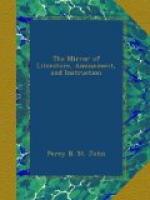Whom calls the minstrel’s Fatherland?
It calls on spirits pale with
wonder,
In desperation’s words
of thunder,
To rise and burst its chain
asunder.
On retribution’s
vengeful hand,
On this calls
my Fatherland.
What would the minstrel’s Fatherland?
To blot out slav’ry’s
foul disgrace,
The bloodhound from its realms
to chase,
And free to bear a freeborn
race:
Or bid them free
beneath its sand,
This, this would
my Fatherland.
And hopes the minstrel’s Fatherland?
Yes, that for God and Deutchland’s
sake,
Its own true people will awake,
And outrag’d heaven,
vengeance take;
That he,[3] whose
prowess has been scann’d,
Will save the
minstrel’s Fatherland.
H.
[3] Blucher.
* * * * *
THE NATURALIST.
* * * * *
ERRORS IN NATURAL HISTORY.
(From Chit-chat, in the Magazine of Natural History, by Dovaston and Von Osdat.)
Dov. Ray tells a humourous story, that, after the patiently exploring commissioners, at the end of their long examinations, deliberately confessed their utter ignorance to account for the Goodwin Sands, an old man gravely asserted Tenterden steeple to be the cause.
Von Os. Tenterden steeple!
Dov. Ay; Tenterden steeple: for that those sands first appeared the year it was erected.
Von Os. And the slightest interview with the mass of mankind, any hour, will prove the race of Tenterden philosophers to be far from extinct.
Dov. Particularly with regard to facts relative to natural history: and this is the more lamentable, and perhaps the more surprising, when we consider its unlimited adaptability to all capacities, ages, sexes, and ranks; and, moreover, the absolute necessity of many parts of it to their intellectual existence.
Von Os. There is in our village, a slater, very fond of keeping bees. These useful insects, he says, at breeding-time sweat prodigiously; and each lays four eggs at the bottom of each cell: soon after which, he has observed the combs to become full of maggots, which must be carefully destroyed by smoke! When any one of his numerous family is buried, as the corpse passes out of the house, he carefully loosens every hive, and lifts it up; otherwise, he says, the bees would all die!
Dov. The superstitions about bees are numberless.
Von Os. And yet this poor fellow believes himself inspired with “grace abounding;” and readily undertakes to “spound,” as he calls it, any verse read to him, however remotely insulated from the context.




